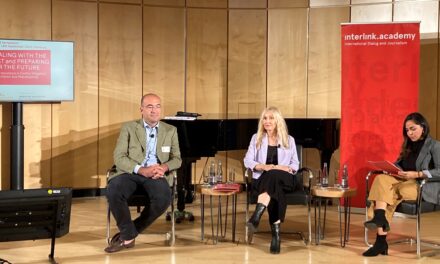Press Release – 3rd June 2011
City University London this week hosted a major international working conference aimed at ending the impunity of those who murder, assault or threaten journalists around the world and developing new global initiatives intended to protect them from violence.
The event, on Wednesday 1st June, was organised by the directors of the Initiative on Impunity and the Rule of Law, a joint project between the University’s Centre for Law, Justice & Journalism (CLJJ) and the Centre for Freedom of the Media (CFOM) at the Department of Journalism Studies, University of Sheffield.
Entitled ‘Safety and Protection for Journalists: A Responsibility for the World’, the conference was opened by Janis Karklins, UNESCO Assistant Director-General for Communication and Information. Among those leading discussions were Roland Bless, Director of the Office of the OSCE Representative on Freedom of the Media, Gavin Simpson, from the Office of the Council of Europe’s Commissioner for Human Rights, and Susan Hyland, Director of Human Rights at the UK Foreign Office.
The event also marked the launch of a topical report by the New York-based Committee to Protect Journalists, which revealed 13 countries around the world with five or more unsolved cases of murdered journalists committed during the past decade. In those countries alone, 251 journalists were killed with impunity in that period.
The conference, which was also sponsored by the Swedish National Commission for UNESCO, Norwegian Pen and the Open Society Foundation, ended with a session dedicated to establishing effective measures to improve the protection for journalists and improve compliance around the world in advance of UN inter-agency talks in September.
The Impunity Initiative is a joint venture between CLJJ and CFOM, the organisers of which are City’s Professor Lorna Woods (Associate Dean for Research at The City Law School), Professor Howard Tumber (Director of Research, Department of Journalism) and Dr Carmen Draghici (The City Law School) and Sheffield’s Professor Jackie Harrison (Chair of CFOM, Department of Journalism Studies) and William Horsley (International Director of CFOM).
The initiative has already received the backing of Archbishop Desmond Tutu, a long-time advocate for the worldwide protection of journalists’ rights. In a special message to the conference, he said: “The right of journalists to report freely is of vital importance to people in all parts of the world and those who sue violence, assassination or detention to try and intimidate journalists must be held accountable for their actions.”
Archbishop Tutu added: “The high toll of deaths and injuries among media workers around the world in recent years is outrageous and unacceptable. I appeal to governments everywhere to ensure that law enforcement and judicial authorities protect journalists’ rights and take action to end impunity for such crimes.”
The conference marks the end of the first stage of the project, which is ultimately intended to lead to concrete action by NGOs, governments and other international bodies to end impunity for those responsible for killing, threatening or suppressing the work of journalists.
Professor Lorna Woods said: “Powerful evidence suggests that a disturbing climate of impunity in respect of deliberate and widespread violence against journalists, as well as the suppression of free opinion and expression, has taken root in recent years in several parts of Europe and further afield. This conference is a vital opportunity to establish a system that will help put an end to this cycle and improve conditions for journalists working in testing regions across the world.”
Professor Jackie Harrison added: “Journalists play a vital role in providing reliable information on matters of public interest and their work can expose them to special risks of physical violence and arbitrary prosecution. It is important that we improve measures to protect their freedom to report.”
The main materials arising from the London meeting are available on the Conference website at: www.cfom.org.uk.
For all media enquiries, please contact Ben Mitchell, Senior Press & Communications Officer at The City Law School, on 020 7040 4206 / 07811 230197 or at Ben.Mitchell.1@city.ac.uk
Notes to Editors
About CLJJ
Based at City University London, the Centre for Law, Justice & Journalism is a new hub for collaboration and knowledge transfer between the UK/EU legal and justice profession and the global journalism and media community.
It is the first major interdisciplinary centre in the UK to develop a broad yet focused interface between law, justice and journalism in society. It aims to harness and maximise opportunities for research collaboration, knowledge transfer and teaching to become a centre of excellence.
The Centre brings together experts from the disciplines of Law, Criminology and Journalism at City University London. Other disciplines and fields such as International Politics, Communications Policy and Forensics provide important intellectually relevant and distinctive additions to the Centre.
For more information, please visit – www.city.ac.uk/interdisciplinary-city/centre-for-law-justice-and-journalism
About CFOM
The Centre for Freedom of the Media (CFOM) is an interdisciplinary research centre based at the Department of Journalism Studies at the University of Sheffield that studies issues of media freedom and standards.
The founding principle of CFOM is to illuminate where news media freedom is undermined or abused and to examine news media standards of independence and truthfulness.
CFOM is a unique university-based body which will for the first time form a research network by bringing together journalists, experts and scholars of the media, with public figures and the newsmakers themselves to research and evaluate the role of free and independent news media in building and maintaining political and civil freedom.
For more information about CFOM and the impunity initiative see: www.cfom.org.uk
About City University London
City University London is an international University with a reputation for academic excellence and a central London location. It was placed in the top 5% of world universities by Times Higher Education World University Rankings 2010-11.
The University leads London in education, research and enterprise for business and the professions and is ranked 10th in the UK for both the employability of its graduates (by The Times Good University Guide 2011) and graduate starting salaries (by The Sunday Times University Guide 2011).
City is broadly-based with world leading strengths in the arts, including journalism and music; informatics; social sciences; engineering and mathematical sciences; business; law; community and health sciences.
The University attracts over 21,000 students from around 160 countries and academic staff from around 70 countries.
City was founded in 1894 and in 2016 will celebrate its first half century since gaining University title.
About University of Sheffield
Founded in 1905, the University of Sheffield is one of the UK’s leading Russell Group universities with an outstanding record in both teaching and research. It is ranked among the world’s top 100 universities and has produced 5 Nobel Prize winners thusfar.
The University currently has more than 24,000 students from 131 countries and almost 6,000 staff.




